MercoPress. South Atlantic News Agency
Tag: IMF
-
Monday, October 1st 2018 - 08:56 UTC
Beijing currency swap support for Argentina
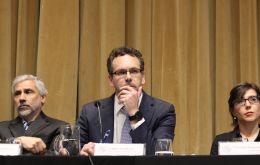
Argentina has “nearly closed” a new currency swap deal with China that will add the equivalent of US$ 9 billion to the South American country’s reserves, the central bank said on Sunday. Argentina and China first agreed to a swap program in 2009 to boost the South American country’s dwindling reserves under former President Cristina Fernandez. Last year, the center-right government of President Mauricio Macri and China agreed to extend the program for three more years.
-
Friday, September 28th 2018 - 08:58 UTC
Brazilian currency strengthens below 4 to the dollar: first time in five weeks
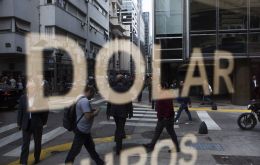
The Brazilian currency dipped under four Real to the dollar for the first time in five weeks at close on Thursday as the markets reacted favorably to the emergence of two clear presidential election frontrunners. The Real closed at 3.99 to the US dollar just two weeks after hitting a record low of almost 4.2 to the dollar -- it's lost around 17% since the start of the year.
-
Thursday, September 27th 2018 - 09:19 UTC
Argentine Peso with trading band and zero growth monetary supply policy
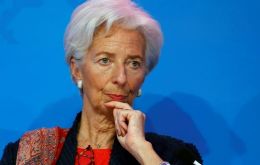
The International Monetary Fund Managing Director Christine Lagarde, speaking at a news conference in New York alongside Argentine Economy Minister Nicolas Dujovne, said IMF was “significantly frontloading” disbursements under the program adding the Argentine central bank had agreed as part of the deal to allow the peso currency to float freely and would only intervene in the foreign exchange market in extreme circumstances.
-
Tuesday, September 25th 2018 - 21:35 UTC
Who is Guido Sandleris, Argentina's Central Bank president after the surprise resignation of Caputo

The resignation of Luis Caputo to the Presidency of the Central Bank of Argentina (BCRA), which has been reflected with surprise by the international media, occurs amid the trip of the Argentine President, Mauricio Macri, to New York to attend the Assembly General of the UN and with the mission of restoring the confidence of the international market in the Argentine economy. His predecessor, Guido Sandleris, receives a Central Bank when it is about to close an agreement with the International Monetary Fund (IMF).
-
Monday, September 24th 2018 - 09:19 UTC
Macri in New York to convince investors Argentina in on track to stability and address the UN assembly
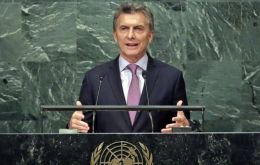
Argentine president Mauricio Macri is in New York where he is scheduled to address the United Nations General Assembly on Tuesday, but will also be holding a round of talks with business leaders and potential investors, plus granting interviews to key media outlets.
-
Friday, September 21st 2018 - 09:32 UTC
Argentine Peso recovers strongly and with no support from the Central bank
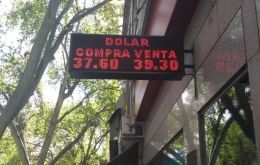
The Argentine Peso reacted strongly against the US dollar on Thursday following on an abundant private supply of greenbacks to satisfy demand, which kept the Central Bank out of the market for the first time since the beginning of the month. The dollar fell 2.8% and ended trading below 39 Pesos.
-
Friday, September 21st 2018 - 08:47 UTC
Argentine Peso at an equilibrium point, says head of Central bank

Argentina’s central bank now sees the Peso at an equilibrium level, chief Luis Caputo told market participants who attended a meeting with him on Thursday. The statement comes after two days of strengthening by the peso following a rout that sent it to a record intra-day low in late August.
-
Friday, September 21st 2018 - 08:31 UTC
Argentina/IMF making “important progress” on reforms for loan package, but no specific timeline

Argentina's budget proposal submitted this week is a key element in the reforms needed for a new loan package for the crisis-hit country, an International Monetary Fund spokesman said Thursday.
-
Friday, September 21st 2018 - 08:24 UTC
Argentine stock market booming with new highs for seventh day running
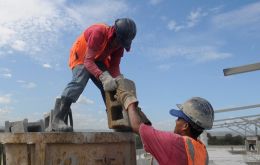
The Argentine stock market is booming and on Thursday confirmed its seventh day running increase as investors are flocking encouraged by an imminent accord between the president Mauricio Macri administration and the IMF for a new loan package including reforms and a balanced budget in the next 18/24 months.
-
Wednesday, September 19th 2018 - 09:05 UTC
Argentine Peso slid on Tuesday but the Merval stock market climbed a strong 3%
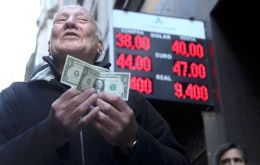
Argentina’s central bank sold US$ 261 million in reserves on Tuesday, the monetary authority said in a statement announcing its latest intervention in the foreign exchange market aimed at easing the fall of the local currency.
